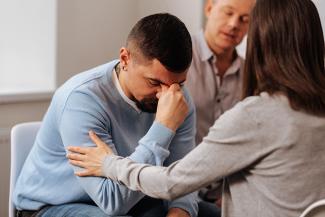
Yuna Angell, who has schizophrenia, advocates it is important to be empathic and sensitive to people living with mental illness and advises how best to communicate with them.
Although I have schizophrenia and depression, it still does make me feel awkward when people tell me they have mental illness. I’m at a loss as to what to respond afterwards sometimes. For me, I’ll just say, “Me too. I have schizophrenia and depression. How are you coping with your medication or counselling sessions?”
I wonder if people notice but I will feel myself blushing, because I feel embarrassed. Do you wonder what you should say too after someone tells you they have a mental illness? “How are you coping?” This question and reply is to me, a show of concern. It also lets me know if I should end the conversation or continue according to the other person’s comfort level.
Mental illness doesn’t necessarily mean someone is mad. I’ve asked a psychiatrist many years ago whether I was mad because I was diagnosed with schizophrenia. He told me if I was not responsive to most or all of the treatments, and was “too far gone”, then maybe he would agree that I had madness. He added that most cases of the persons with mental health issues respond positively to at least some treatments.
At the beginning of my mental illnesses, I was in quite a bad shape. The nurses had to shower me daily in a one to two week stay in the mental health hospital ward when I was diagnosed in 2004. But through long term medication, some therapy for myself using writing, and going for multiple counselling sessions on and off during the long years of my mental illnesses, I have recovered mostly. Although the psychiatrists say there is no known cure for schizophrenia, I’ve recovered to the point that I feel mostly normal except for side effects which might affect me daily, like having hand tremors and body aches. I also have anxiety attacks and depressive moods. I live my days, step by step, and day by day. That’s how I deal with life currently. Of course I want to and try to plan my future ahead a bit sometimes but like anyone with or without mental illnesses, you never know what life throws at you, plans can change.
Mental illness is more common than you think.
There is no “common look” on a person to tell you if they have a mental illness. It can happen to anyone, especially looking at the example of depression as a common mental illness. In the stressful societies of the modern world, especially with the pros and cons of the social media era, it is only making things worse.
Medical researchers have come up with the idea of “Facebook depression” but for me, I feel more uplifted by Facebook personally. I follow Science and Business Facebook Pages as well as Christian devotional Facebook Pages. I learn a lot of things everyday from them. I guess it comes down to what you choose to follow or see on Facebook and other social media outlets too. But I do admit I sometimes feel sad about seeing friends having a good time from the pictures they post. Could that be a tiny bit of common ground for mental illness? Yes and no. Mental illness is more than that. Depression is not just sadness, it is a feeling of sadness constantly over a longer period of time.
”I never knew that depression was a mental illness many years ago. I thought it was just extreme sadness, a deep emotion. Depression rates are high all over the world in most places. According to the World Health Organization fact sheets, “depression is a common mental disorder. Globally, more than 300 million people of all ages suffer from depression.”
According to Wikipedia depression is a state of low mood and aversion to activity that can affect a person's thoughts, behavior, tendencies, feelings, and sense of well-being. A depressed mood is a normal temporary reaction to life events such as loss of a loved one. A prolonged depressed mood, especially in combination with other symptoms, may lead to a diagnosis of a psychiatric or medical condition which may benefit from treatment.
Of course having mental illnesses can prove to be challenging, along with the common challenges of the social media and technologically advanced era we are living in now. Prolonged stress may lead to physical and mental illnesses. So instead of “that’s them and that’s us” attitude, let’s be more inclusive of each other.
5 things you can say
- How are you coping with your mental illness? Is there a counsellor to help you?
- Do you need someone to talk to?
- Should we look up the mental health hotlines together?
- Is there anything I can help you with?
- How are you coping with work stress?
5 things you should never say
- Please don’t get married. No one will ever accept that you have mental illness, especially their families.
- Please don’t have children! They will inherit your madness genetics!
- No employer wants to hire someone with mental illness.
- You are demon possessed, not mentally ill! Stay away from me!
- If you are mentally ill, are you a psycho?
We might be smiling or look like we’re behaving normally but we are dealing with the unseen side effects. A kind word might light up our days.
Yuna Angell is an author, poet, mental health advocate and aspiring poetry workshop trainer. She is based in Singapore. She was diagnosed with schizophrenia in 2004 and had been hospitalized 11 times from 2004 to 2017. She is on the recovery journey and trying to sell ebooks for a living.






